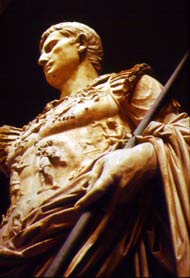Caesar's inheritance
 The conspirators wanted to restore the Republic, but instead, another round of horrors followed. There were troops; there were politicians who aspired to Caesar's autocratic power; and they were prepared to use the troops.
The conspirators wanted to restore the Republic, but instead, another round of horrors followed. There were troops; there were politicians who aspired to Caesar's autocratic power; and they were prepared to use the troops.
Marc Antony, the consul, was now the official head of the state, and his first act was the confiscation of Caesar's papers and treasury. Then, he secured the co-operation of the commander of Caesar's troops outside Rome, Lepidus. Having the men and the money, he could negotiate from strength, and dictated the murderers a compromise: they were to receive amnesty, while Caesar's acts were to be respected, and he would be worshipped as a god. At the end of the day, Marc Antony was in charge of the city.
That very day, Piso opened the testament of his son-in-law. It contained precisely the material that Marc Antony needed: Caesar left his gardens as a park to the city of Rome, and gave every inhabitant a large amount of money. Several days later, Caesar's corpse was burned on the forum. The Roman mob saw the blood-stained cloak, and heard of the money that was to be distributed among them. Then, Marc Antony delivered the funeral oration, in which he inflamed their emotions: shortly after the assault, Caesar's murderers had to escape from the city that they had wished to liberate.
There was one minor cloud on Marc Antony's horizon: Caesar had left three quarters of his estate to his great-nephew Octavius, who was with the army in the east. Most important, Caesar had adopted him as a son, which meant that the eighteen years old Octavius had to change his name and would from now on be called Caius Julius Caesar Octavianus, i.e. Caesar from the Octavius family. The boy decided to return to Italy, and demanded his share, which Antony had already confiscated. At first, nobody seemed to notice the boy, except for Caesar's veterans, but Caesar Octavianus couldn't pay them. However, the soldiers were enthusiast and loved the new Caesar.
By accident, Decimus Brutus was governor of Cisalpine Gaul, and Marc Antony had reason to fear his troops. Therefore, he left Rome to drive away Decimus Brutus. While Marc Antony and Decimus Brutus were fighting at Modena, the Senate convened, and Cicero held several speeches in which he tried to incriminate Marc Antony, pointing out that the consul would return with an army. This, he argued, was the moment to restore the Republic, and Caesar Octavianus might be used ("we must praise him, give him a command and then put him away"). The Senate agreed, and even though Caesar Octavianus was now nineteen, they gave him a military command. He didn't disappoint the Senate: in two battles, he defeated Marc Antony, who fled with difficulty across the Alps, where he managed to gain the support of all troops in Spain in Gaul. Then, Caesar Octavianus showed that actually, he had used Cicero: he marched on Rome and demanded the consulship. Again, the Senate had to yield to a revolutionary leader with an army.


|